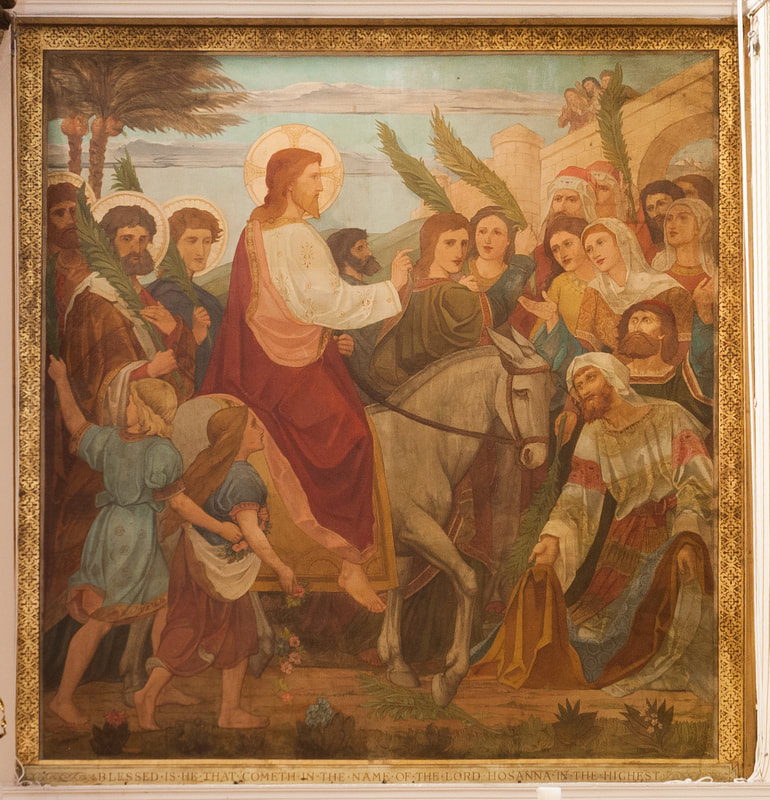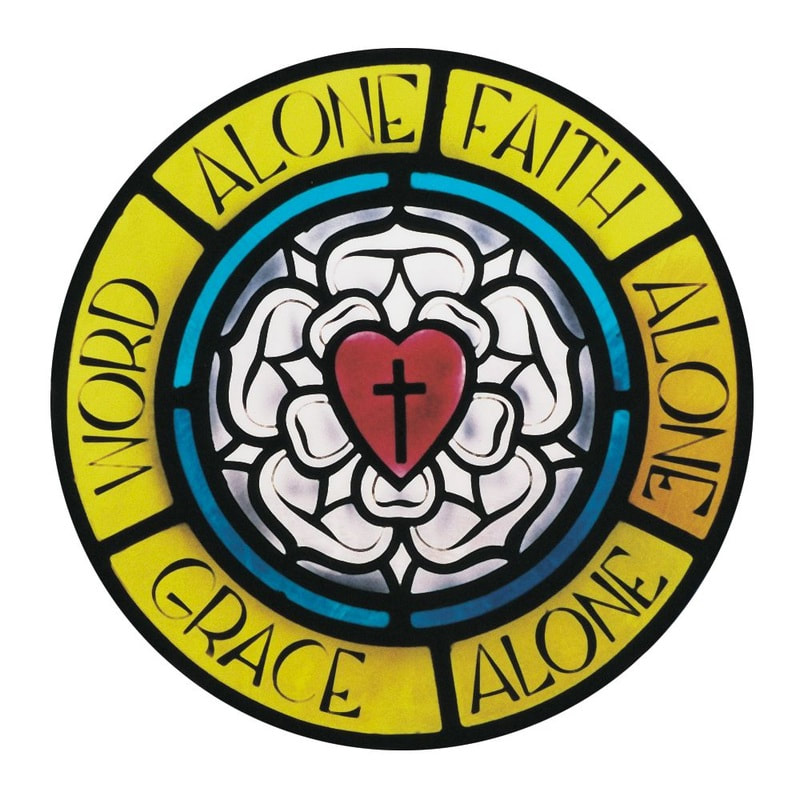Matthew 21:1-9
Pastor James Preus
Trinity Lutheran Church
November 27, 2022
O Lord, How Shall I Meet You by Paul Gerhardt is the perfect Advent hymn. Advent means coming or arrival. We Christians anticipate Jesus’ return. So, the hymnist asks the important question, “O Lord, how shall I meet You, how [shall I] welcome You aright?” Yet, in order to answer that question, we must first answer the question, “How does the Lord come to us?”
He comes humble and lowly on a donkey bringing salvation. It is the week of the Passover as our Lord enters Jerusalem on a donkey. And the crowds following Him and going before Him are singing the Passover Hymn, Psalm 118, “Hosanna, blessed is he who comes in the name of the Lord! Hosanna!” They sing this psalm to Jesus, recognizing Him as the Christ. Yet, what they likely miss is what Jesus has come to do. If you continue to read Psalm 118, you hear the words, “Bind the festal sacrifice with cords, up to the horns of the altar!” (vs 27) And who is this victim, which will be bound and brought to the altar to be sacrificed? It is Christ Jesus, the Son of David, He who comes riding on a donkey. The first thing you need to know about Christ’s coming is that He first came to suffer and die for the sins of the world.
“A Lamb goes uncomplaining forth,
The guilt of sinners bearing
And, Laden with the sins of earth,
None else the burden sharing;
Goes patient on, grows weak and faint,
To slaughter led without complaint,
That spotless life to offer,
He bears the stripes, the wounds, the lies,
The mockery, and yet replies,
‘All this I gladly suffer.’” (LSB 438)
Paul Gerhardt wrote this hymn for Palm Sunday, the Sunday which takes us into Holy Week, when we focus on the suffering and death of Christ for our sins. Yet, this text was written for the same Gospel lesson. Jesus goes into Jerusalem as a lamb going to the slaughter. We cannot receive Jesus except as Him who died for our sins. We cannot welcome Him without gazing on those scars, which healed us from our sins.
God prepared the words the crowd shouted to Jesus during His triumphal entry. Hosanna, while it has become a word of praise means something different than Alleluia! Alleluia means, Praise the LORD. Hosanna means, please, save us now! When Jesus comes to us as the crucified one, who died to take away our sins, the appropriate response is, “Save us now, please!” Jesus comes to take away our sins, so we should repent of our sins and ask God for forgiveness and mercy. This is why we sing these same words before we receive the Lord’s Supper. We sing, “Hosanna, hosanna, hosanna in the highest” before we eat and drink the body and blood of the Lord, because this body and blood were given and shed to save us from our sins. Jesus comes to save us from our sins. So, we sinners receive Him by asking Him to take our sins away. If you feel no sorrow for your sins, if you do not desire Christ to take your sins away, then you are not welcoming Him rightly.
Yet, we do not welcome Jesus rightly simply by having sorrow for our sins. We welcome Jesus with confidence that His sacrifice on the cross truly made atonement for all our sins. Jesus’ blood washes us clean of all our sins. It is with that confession that we welcome our Lord.
First, Jesus comes humbly, bringing salvation with His bitters suffering and death for our sins. Second, Jesus comes to us the way he dictates. Jesus ordered His disciples to go to a certain village to find a particular donkey and her colt and to bring them to Him. He gave them particular words to say to the owner of these beasts when asked why they were taking them. And Jesus’ disciples did exactly as Jesus directed them to do. They didn’t ask why Jesus wanted to ride into Jerusalem on a donkey, when He had spent His entire ministry walking on foot, and had gone into Jerusalem many times without riding on a donkey. They didn’t refuse to carry out this seemingly superfluous task. They did as Jesus directed them. Jesus comes to us the way He directs.
This is an important point. Many people want to have a relationship with Jesus, but they want to have that relationship on their own terms. But it doesn’t work that way. Nowhere in Scripture does it say that Jesus will come to you on your terms or in a way that fits with you. Rather, Scripture tells us how Jesus comes to us. Jesus comes as He directs. Jesus sent His disciples out to every nation commanding them to make disciples by baptizing them in the name of the Father and of the Son and of the Holy Spirit (Matthew 28:19). He promises that this Baptism saves sinners (Mark 16:16). Jesus gave His disciples bread and wine and told them that they were His body and blood given and shed for them for the forgiveness of sins. Moreover, He commanded that we do this as often as we eat and drink it in remembrance of Him (Matthew 26; Mark 14: Luke 23; 1 Corinthians 11). Jesus gave His Church the authority to forgive sins (Matthew 16; 18; John 20), promising that whosoever sins His disciples forgive, they are forgiven before God in heaven. Jesus commanded that His Gospel be preached to all nations (Mark 16:15), and He promised that wherever two or three are gathered in His name, there He is in their midst.
It is no secret how Jesus comes to us in our day and age. Just as He gave clear instructions to His disciples to fetch a donkey and her colt, so that He could ride into Jerusalem, so Jesus gives us clear instructions on Baptism, Absolution, the Lord’s Supper, and the proclamation of the Gospel, what we call the means of grace. It is by these means of grace that Jesus directs that He will come to us and we will receive Him. Yet, those who claim to want to welcome Jesus despise Baptism and the Sacrament of the Altar and refuse to hear Jesus’ Gospel preached.
But, if you want to receive Jesus, you must receive Him as He dictates that He will come. When emphasizing grace, we preachers will often emphasize that Jesus welcomes sinners just as they are. And that is true. While we were still sinners, Christ died for us (Romans 5:8). We cannot make ourselves perfect before we meet Christ. Christ makes us perfect. Christ receives you as you are. Yet, it is equally important to emphasize that you in faith must receive Christ as He is. Jesus clearly teaches that he comes to us through His Word and Sacraments, so that is how we should receive Him. When you accept the forgiveness and grace that Jesus offers you in the Sacraments and the preached Gospel, then you are accepting Christ Jesus Himself. Saving faith clings to how Jesus directs that He will come to us.
Finally, when Jesus comes to us, He always fulfills Scripture. Jesus road into Jerusalem on a donkey before He was crucified for the sins of the world, because that is what the prophet Zechariah said would happen (Matthew 21:4-5; Zech. 9:9). Jesus died and rose for our sins in order to fulfill the Scriptures (1 Corinthians 15). Jesus will return to judge the living and the dead in order to fulfill the Scriptures (Daniel 10; Matthew 24-25; etc). The Bible is the Word of God. Jesus did not come to abolish the holy Scriptures, but to fulfill them (Matthew 5:17). So, if you want to recognize how Jesus comes to you and how He will come to you, you must look to Scripture alone.
We cannot determine what we will believe or how we will worship Jesus or how we will prepare for His coming by our own emotions, thoughts, and imaginations. How we feel does not determine what is faithful. Holy Scripture determines what is faithful. And what we imagine does not determine what will happen. What Scripture prophesies determines how the end times will unfold. Scripture declares that Christ will come to judge the living and the dead (Matthew 24-25; 2 Timothy 4:1; 1 Peter 4:5). So Scripture warns us how we should behave. We heard St. Paul write to the Romans:
Besides this you know the time, that the hour has come for you to wake from sleep. For salvation is nearer to us now than when we first believed. The night is far gone; the day is at hand. So then let us cast off the works of darkness and put on the armor of light. Let us walk properly as in the daytime, not in orgies and drunkenness, not in sexual immorality and sensuality, not in quarreling and jealousy. But put on the Lord Jesus Christ, and make no provision for the flesh, to gratify its desires. (Romans 13:11-14)
So, we welcome Christ by paying attention to His Word in holy Scripture and by daily repenting of our sins, so that we are not caught unprepared. Continuing in sin without repenting destroys faith. And if you have faith in Jesus Christ, you will repent of your sins and fight against your fleshly desires.
The city of Jerusalem was disturbed by Jesus’ arrival, and many citizens asked the crowd, “Who is this.” They gave an unsatisfactory answer, “This is the prophet Jesus, from Nazareth of Galilee.” However, we can give a much better answer. This is Jesus, true God and true man, who has died for all our sins. He comes to us in Baptism, washes away our sins and makes us God’s children. He forgives our sins through the mouth of His ministers. He feeds us His very own body and blood, which forgive our sins and strengthen our faith. He always stays near us through His preaching, and my heart receives Him through faith in His promise. He will again come to judge the living and the dead. For this reason, I should daily repent of my sins and seek Christ’s mercy in His means of grace by which He comes to me. Yet, I am not afraid of His second coming. He comes to set me free from sin, death, and hell. I welcome Him today in faith as He comes to me in His Word and Sacrament. And I will welcome Him when He comes to me in His power.
So can we answer the question, “Who is this?” and “How is He coming to us?” and “How shall we meet Him?” These answers have been given to us by Christ Jesus Himself in Holy Scripture. Confident in Christ’s Word, we know how to meet our Lord as He comes to us. Amen.


 RSS Feed
RSS Feed